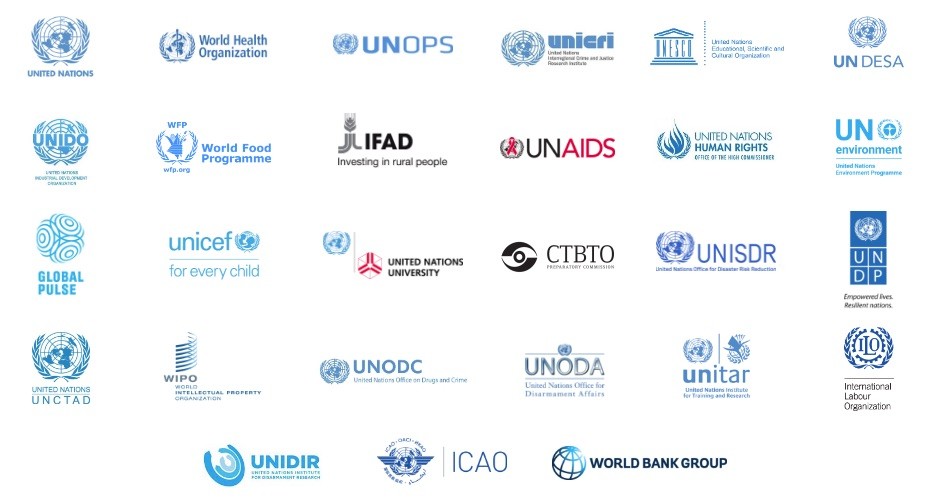AI for Good Global Summit – May 2018

The Machine Intelligence Institute of Africa (MIIA) and Africa will be represented via Dr Jacques Ludik’s participation as invited AI expert at the 2nd edition of the AI for Good Global Summit in Geneva, Switzerland on 15-17 May 2018. This Summit is organized by ITU in partnership with XPRIZE Foundation, the global leader in incentivized prize competitions, the Association for Computing Machinery (ACM) and sister United Nationsagencies including UNESCO, UNICEF,UNCTAD, UNIDO, Global Pulse, UNICRI, UNODA, UNIDIR, UNODC, WFP, IFAD, UNAIDS, WIPO, ILO, UNITAR, UNOPS, OHCHR, UN University, WHO, UNEP, ICAO, UNDP, The World Bank, UN DESA, CTBTO, UNISDR, and UNOG.
The AI for Good series is the leading United Nations platform for dialogue on AI. The action-oriented 2018 summit will identify practical applications of AI and supporting strategies to improve the quality and sustainability of life on our planet. The summit will continue to formulate strategies to ensure trusted, safe and inclusive development of AI technologies and equitable access to their benefits.
While the 2017 summit sparked the first ever inclusive global dialogue on beneficial AI, the action-oriented 2018 summit will focus on impactful AI solutions able to yield long-term benefits and help achieve the Sustainable Development Goals. ‘Breakthrough teams’ will demonstrate the potential of AI to map poverty and aid with natural disasters using satellite imagery, how AI could assist the delivery of citizen-centric services in smart cities, and new opportunities for AI to help achieve Universal Health Coverage, and finally to help achieve transparency and explainability in AI algorithms.
Teams will propose impactful AI strategies able to be enacted in the near term, guided by an expert audience of mentors representing government, industry, academia and civil society. Strategies will be evaluated by the mentors according to their feasibility and scalability, potential to address truly global challenges, degree of supporting advocacy, and applicability to market failures beyond the scope of government and industry. The exercise will connect AI innovators with public and private-sector decision-makers, building collaboration to take promising strategies forward.
“As the UN specialized agency for information and communication technologies, ITU is well placed to guide AI innovation towards the achievement of the UN Sustainable Development Goals. We are providing a neutral platform for international dialogue aimed at building a common understanding of the capabilities of emerging AI technologies. ” – Houlin Zhao, Secretary General of ITU
Website: https://www.itu.int/en/ITU-T/AI/2018/Pages/default.aspx
Invited Experts: https://www.itu.int/en/ITU-T/AI/2018/Pages/Invitedexperts.aspx
Contact: ai@itu.int
Building on the spark created by the first AI Summit in 2017, the second AI Summit in 2018 will identify practical solutions of how AI can accelerate progress towards the United Nations’ Sustainable Development Goals (SDGs). There are 17 SDGs, 169 targets, and around 230+ indicators to measure the SDGs. All indicators in one file are listed here. The goal of the Summit is to launch projects that can be implemented in the coming months. The Summit is not about reporting, it is about building.
The heart of the Summit are the following tracks on Day 2 (16 May 2018):
- AI and satellite imagery Team lead: Stuart Russell, Professor of Electrical Engineering and Computer Sciences, UC-Berkeley
- AI and health Team leads: Marcel Salathé, Associate Professor & head of the Digital Epidemiology lab, EPFL; World Health Organization (WHO)
- AI and smart cities & communities Team lead: Renato de Castro, SmartCity Expert
- Trust in AI: Team leads: Huw Price, University of Cambridge; Francesca Rossi, University of Padova and IBM Watson; Stephen Cave, Leverhulme Centre for the Future of Intelligence at the University of Cambridge;
Each track is curated by a team. The team will also identify, in the time leading up to the Summit, projects that could be launched at the Summit. The teams will present an overview of their respective track on Day 1, during the last plenary. During Day 2, the four tracks will run in parallel. On Day 3 in plenary, findings of each track will be summarized and presented.
1st edition of the AI for Good Global Summit (2017):
- Main video (Day one): https://youtu.be/UWw_8Obl5eY
- Day 2: https://youtu.be/vBJqN41bB9g
- Day 3: https://youtu.be/giSbuW7o_7g
The AI for Good Global Summit is followed by another conference on AI Policy and Regulation where Dr Jacques Ludik will also be participating in the panel discussion “Adopting AI in Industries: Potential and Challenges”.
Conference on AI Policy and Regulation (Geneva, May 18)
Permanent Mission of India to Conference on Disarmament and Observer Research Foundation
Applications of Artificial Intelligence (AI) and the use of Autonomous Technologies (AT) are growing. The social, political and economic impact of these technologies is significant. Discussions on ethical aspects, possible standards and norms have started already in several jurisdictions including Canada, China, Germany, EU, India, Japan, Norway, Republic of Korea, UK and the U.S. From a multilateral perspective there would be value in an exchange of nascent national experiences on AI/AT policy and standards. Such an exchange, particularly in a Track 1.5 setting, could generate insights for discussions on rules and standards related to AI/AT in inter-governmental forums. Such an exchange of information could also be an important component of future confidence-building measures in platforms such as the Convention on Certain Conventional Weapons (CCW).
9:15 – 9:30 AM Introduction
9:40 – 10:00 AM Keynote Address
10:00 – 11: 20 AM Transforming Governance through Emerging Technologies – lessons from Asia and Africa
From the emergence of digital identity programs in South Asia to the use of mobile money in Africa, policymakers across jurisdictions are exploring how technology can be adopted in various sectors while addressing the challenge of inclusion, building capacity, providing economic incentives and creating jobs. Asgovernments in emerging countries try to ease AI and autonomous technologies (AT) into their societies, the march of technology appears to be headed on a collision course with centuries-old structures of industry and economics. The panel consisting of experts from Asia and Africa will take stock of developments in AI policy and e-governance initiatives undertaken by their respective governments; and specifically identify policy priorities and capacity gaps for emerging economies.
Themes: a) What are the main domains of application of AI/AT and how are governments promoting, researching and developing these applications? Specifically, how are emerging economies adopting these technologies to tackle challenges of financial inclusion? b) How can national experiences inform the international consideration of future use of AI and AT based applications? c) What are the gaps in current AI/AT related policy research – nationally and internationally – that need to be addressed over the next 3-5 years?
11:30 – 12: 50 PM Building Normative Frameworks for AI and Governance: Lessons from the US and EU
The West has traditionally been considered the progenitor of new technologies and the rules that govern them – they continue to do so with the emergence of artificial intelligence.Policymakers from Transatlantic states have taken the lead in incubating talent in the sector, incentivizing startups through their regulatory frameworks and finally, in discussing norms to regulate the use of such technologies. This panel will discuss the commonalities in their strategic vision that gives these states an edge in building and scaling these technologies. Is there a normative framework that can drive this growth in other parts of the world?
Themes: a) How can governments promote the adoption of AI across sectors domestically? What initiatives can governments take to train the next generation of the workforce? b) How can technologically advanced states in Europe and America develop a global, strategic vision on adoption of AI and create platforms for engagement on norms?
12:50 – 2: 00 PM Lunch
2:00 – 3: 20 PM Adopting AI in Industries: Potential and Challenges
With AI estimated to add to add USD 15.7 trillion to the global GDP by 2030, the opportunities for both incumbents and startups is huge. At the same time, companies will need to focus on skilling the workforce and identifying points in the supply chain for integration of AI. This, however, will require greater consideration on the design, purpose and deployment of AI. This panel will discuss how early adopters of AI are using the technology in different forms in their businesses. How is this AI transforming products, processes and outcomes for companies in industries such as FinTech and healthcare?
Themes: a) How can businesses use AI to reduce costs, increase efficiency and solve problems even before they arise, across various sectors? b) Can a normative framework such as a hippocratic oath for AI designers serve better in the long run rather than regulation in the form of binding instruments?
3:30 – 5: 00 PM Closing Session: Regulating AI and Establishing Policy Goals
The social and economic impact of AI cannot be mitigated by merely overseeing the design of the technology. The impact of AI must be regulated too to instill trust, ensure safety and create public awareness. With algorithmic decision making already being applied widely and AI applications being deployed in some sectors, how can legacy legal frameworks be adapted for these technologies? This panel will discuss how the policy community can focus their efforts both domestically and internationally to build a normative consensus to regulate AI. The panel will also explore the role of the industry and identify short term and long term goals for the broader community.
Themes: a) What are the regulatory and other concerns related to AI applications? Are they being considered holistically or are there some sector-specific (e.g. health, autonomous vehicles) regulatory issues? b) How are these concerns proposed to be tackled – laws, rules, industry standards, public awareness campaigns etc.? Do plans for governance differ significantly across the globe or are there common elements?
Machine intelligence Institute of Africa (MIIA)
- Website: http://machineintelligenceafrica.org
- Community: http://machineintelligenceafrica.org/members/
- Events: http://machineintelligenceafrica.org/activities/events/
- Projects: http://machineintelligenceafrica.org/activities/projects/
- Partners: http://machineintelligenceafrica.org/partners/
- Blog: http://machineintelligenceafrica.org/blog/
- LinkedIn Articles: https://www.linkedin.com/in/jacques-ludik-0b22861/detail/recent-activity/posts/
- LinkedIn Group: https://www.linkedin.com/company/10095978/
- MIIA YouTube Channel (Playlist): http://www.youtube.com/playlist?list=PLOqigXLyHjNYf8R4WIM7HMVbQpQ03QNu-
- To join the MIIA community on Slack, our real-time community messaging platform, please sign-up here.
Some Recent MIIA posts:
- Exciting AI Developments in Africa and Beyond!
- Machine Intelligence Institute of Africa 2018
- Machine Intelligence Institute of Africa – Season’s Greetings!
- Deep Learning in Africa
- Artificial Intelligence in Africa
- How Artificial Intelligence disrupts Industries
- Deep Learning applications, platforms, limitations and quantum computing
- AI in Manufacturing and Data Science/IoT hackathon on Mining data
- Data Science and Machine Intelligence use cases in Africa 2017
- Machine Intelligence Institute of Africa collaboration with Data Science Nigeria
- Solving Intelligence, Solving Real-world Problems
- Artificial Intelligence and Data Science use cases in Africa
- Machine Intelligence Institute of Africa
- Artificial Intelligence in Finance, Education, Healthcare, Manufacturing, Agriculture, and Government
- Artificial Intelligence at the centre of MIIA partner activities with Silicon Cape, Rise Africa, and Insights2Impact
Joining Machine Intelligence Institute of Africa (MIIA)
- Anyone interested to join MIIA and/or participate in using smart technologies to help address African problems such as those in education, finance, healthcare, energy, agriculture and unemployment is welcome to do this here. See How to participate for more details on various ways to help MIIA execute its mission.
- View the current MIIA Community on the MIIA website as well as MIIA communications on Slack, the LinkedIn group, Meetup, Google+, FaceBook, and Twitter.
- MIIA Meetup in Cape Town: https://www.meetup.com/Machine-Intelligence-Institute-of-Africa/
- MIIA Meetup in Johannesburg/Pretoria: https://www.meetup.com/Machine-Intelligence-Institute-of-Africa-Jhb-Pta/
To join the MIIA community on Slack, our real-time community messaging platform, please sign-up here.
- If you have any issues in this regard let us know via info@machineintelligenceafrica.org. As Slack is our primary community chat and messaging vehicle, we highly recommend that you join us on this platform as well.







